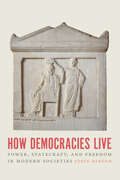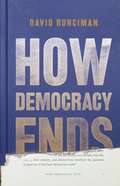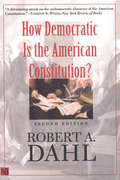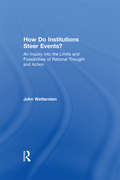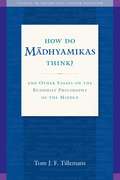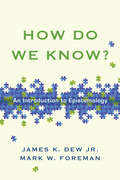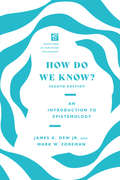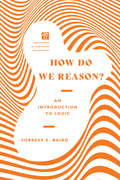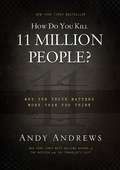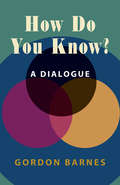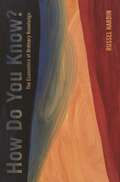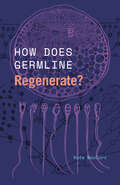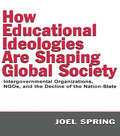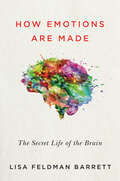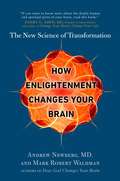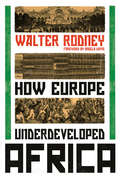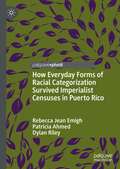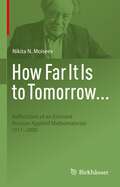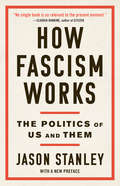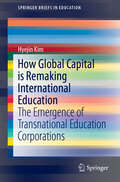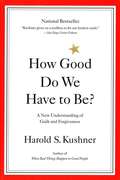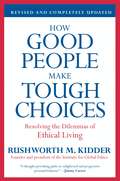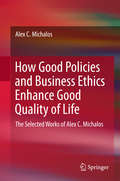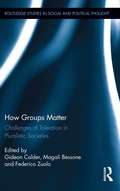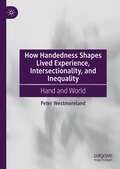- Table View
- List View
How Democracies Live: Power, Statecraft, and Freedom in Modern Societies
by Stein RingenTimes have not been kind to democracy. This book is in its defense. In the new century, the triumph of democracy at the end of the Cold War turned to retrenchment. The core democracies, in America and Britain, succumbed to polarization and misrule. Dictatorships, such as China, made themselves assertive. New democracies in Central Europe turned to muddled ideologies of “illiberal democracy.” In this book, Stein Ringen offers a meditation on what democracy is, the challenges it faces, and how it can be defended. Ringen argues that democracy must be rooted in a culture that supports the ability of citizens to exchange views and information among themselves and with their rulers. Drawing on the ideas of Machiavelli, Aristotle, Tocqueville, Max Weber, and others, Ringen shows how power is the fuel of government, and statecraft turns power into effective rule. Democracy should prize freedom and minimizing unfairness, especially poverty. Altogether, Ringen offers powerful insight on the meaning of democracy, including a new definition, and how countries can improve upon it and make it function more effectively. Timely and thought-provoking, How Democracies Live is a sober reminder of the majesty of the democratic enterprise.
How Democracy Ends
by David RuncimanHow will democracy end? And what will replace it? A preeminent political scientist examines the past, present, and future of an endangered political philosophySince the end of World War II, democracy's sweep across the globe seemed inexorable. Yet today, it seems radically imperiled, even in some of the world's most stable democracies. How bad could things get?In How Democracy Ends, David Runciman argues that we are trapped in outdated twentieth-century ideas of democratic failure. By fixating on coups and violence, we are focusing on the wrong threats. Our societies are too affluent, too elderly, and too networked to fall apart as they did in the past. We need new ways of thinking the unthinkable--a twenty-first-century vision of the end of democracy, and whether its collapse might allow us to move forward to something better.A provocative book by a major political philosopher, How Democracy Ends asks the most trenchant questions that underlie the disturbing patterns of our contemporary political life.
How Democratic Is the American Constitution?
by Robert A. DahlIn this provocative book, one of our most eminent political scientists poses the question, "Why should we uphold our constitution?" The vast majority of Americans venerate the American Constitution and the principles it embodies, but many also worry that the United States has fallen behind other nations on crucial democratic issues, including economic equality, racial integration, and women's rights. Robert Dahl explores this vital tension between the Americans' belief in the legitimacy of their constitution and their belief in the principles of democracy. Dahl starts with the assumption that the legitimacy of the American Constitution derives solely from its utility as an instrument of democratic governance. Dahl demonstrates that, due to the context in which it was conceived, our constitution came to incorporate significant antidemocratic elements. Because the Framers of the Constitution had no relevant example of a democratic political system on which to model the American government, many defining aspects of our political system were implemented as a result of short-sightedness or last-minute compromise. Dahl highlights those elements of the American system that are most unusual and potentially antidemocratic: the federal system, the bicameral legislature, judicial review, presidentialism, and the electoral college system. The political system that emerged from the world's first great democratic experiment is unique-no other well-established democracy has copied it. How does the American constitutional system function in comparison to other democratic systems? How could our political system be altered to achieve more democratic ends? To what extent did the Framers of the Constitution build features into our political system that militate against significant democratic reform? Refusing to accept the status of the American Constitution as a sacred text, Dahl challenges us all to think critically about the origins of our political system and to consider the opportunities for creating a more democratic society.
How Do Institutions Steer Events?: An Inquiry into the Limits and Possibilities of Rational Thought and Action
by John WetterstenTheories of explanation in the social sciences vacillate between holism and individualism. Wettersten contends that this has been a consequence of theories of rationality which assume that rationality requires coherent theories to be shown to be true. Rejecting these traditional assumptions about rationality Wettersten claims that the traditional explanations of rationality have placed unrealistic demands on both individuals and institutions. Analysing the theories of Weber and Popper, Wettersten shows that Popper made considerable progress in the theory of rationality, but ultimately stayed too close to the ideas of Hayek, he explains how this dilemma leads to difficulties in economics, anthropology, sociology, ethics and political theory, and constructs an alternative theory that rationality is critical problem-solving in institutional contexts. Wettersten contends that 'the critical consideration of theories followed by their improvement' dispenses with the need for justification and sees rationality as a social phenomena with an institutional basis. The main social advantages this view offers is that the degree of rationality individuals achieve may be increased by institutional reform without moralizing and that we can explain how institutions steer events insofar as we understand how they determine the problems which individuals seek to solve. It is argued that the central moral advantage of this view is that rationality is shown to be Spinozistic in the sense that it is natural and furthers morality and peace of mind.
How Do Madhyamikas Think?: And Other Essays on the Buddhist Philosophy of the Middle
by Tom J. TillemansA respected professor of Buddhist philosophy brings readers on a fascinating journey through Buddhism's most animating ideas. Tom Tillemans, who has studied Buddhist philosophy since the 1970s, excels in bringing analytic and continental philosophy into conversation with thinkers in the Sanskrit and Tibetan traditions. This volume collects his writings on the most rarefied of Buddhist philosophical traditions, the Madhyamaka, and its radical insights into the nature of reality. Tillemans' approach ranges from retelling the history of ideas, to considering implications of those ideas for practice, to formal appraisal of their proofs. The 12 essays (four of which are being published for the first time) are products of rich and sophisticated debates and dialogues with colleagues in the field.
How Do We Know?: An Introduction to Epistemology
by Mark W. Foreman James K. Dew Jr.What does it mean to know something? Can we have confidence in our knowledge? Epistemology, the study of knowledge, can often seem like a daunting subject. And yet few topics are more basic to human life. We are inquisitive creatures by nature, and the unending quest for truth leads us to raise difficult questions about the quest itself. What are the conditions, sources and limits of our knowledge? Do our beliefs need to be rationally justified? Can we have certainty? In this primer on epistemology, James Dew and Mark Foreman guide students through this important discipline in philosophy. By asking basic questions and using clear, jargon-free language, they make provide an entry into some of the most important issues in contemporary philosophy.
How Do We Know?: An Introduction to Epistemology (Questions in Christian Philosophy)
by Mark W. Foreman James K. Dew Jr.What does it mean to know something? Can we have confidence in our knowledge? Epistemology, the study of knowledge, can often seem like a daunting subject. And yet few topics are more basic to human life. We are inquisitive creatures by nature, and the unending quest for truth leads us to raise difficult questions about the quest itself. What are the conditions, sources, and limits of our knowledge? Do our beliefs need to be rationally justified? Can we have certainty? In this primer on epistemology, James Dew and Mark Foreman guide readers through this discipline in philosophy. This second edition has been expanded with new material and now serves as the first volume in IVP's Questions in Christian Philosophy series. By asking basic questions and using clear, jargon-free language, they provide an entry into one of the most important issues in contemporary philosophy.
How Do We Reason?: An Introduction to Logic (Questions in Christian Philosophy)
by Forrest E. BairdHow do we think? What does a faithful use of logic look like? Without even pausing to think about it, we exercise our capacity for rational thought. But how exactly does logic work? What makes some arguments valid and others not? In this Questions in Christian Philosophy volume, philosopher Forrest Baird offers an introduction to logic. He considers the basic building blocks of human reason, including types of arguments, fallacies, syllogisms, symbols, and proofs, all of which are demonstrated with exercises for students throughout. In addition, he reflects on the relationship between the use of reason and the Christian faith. With this academic but accessible primer, readers will be introduced to the basics of logic—and encouraged to reason better.
How Do You Kill 11 Million People?: Why the Truth Matters More Than You Think
by Andy AndrewsIf the truth is what sets us free, what does it mean to live in a society where truth is absent? How do truth and lies in the past shape our destiny today? Through the lens of the Holocaust, Andy Andrews examines the critical need for truth in our relationships, our communities, and our government.
How Do You Know?: A Dialogue (Hackett Philosophical Dialogues)
by Gordon BarnesHow Do You Know? explores problems of knowledge that arise in everyday life. If you are not an expert, how can you know that another person is an expert? If experts are politically biased should you still trust them? More generally, how should you approach the testimony of other people: treat it all as "innocent until proven guilty," or is that too simple? Does the internet make us better knowers, or is it just a minefield of misinformation? Is it always irrational to believe a conspiracy theory? Suppose someone just as intelligent and well-informed as you are disagrees with you about something, how should that affect your belief? Can we have knowledge of what is right and wrong?How Do You Know? approaches these issues through the lens of social epistemology and via the preeminently social genre of philosophical dialogue. Its characters think and speak like real people in the world today, discussing and debating issues that are current, practically relevant, and even controversial—while equipping readers with tools and concepts to see more clearly for themselves.
How Do You Know?: The Economics of Ordinary Knowledge
by Russell HardinHow do ordinary people come to know or believe what they do? We need an account of this process to help explain why people act as they do. You might think I am acting irrationally--against my interest or my purpose--until you realize that what you know and what I know differ significantly. My actions, given my knowledge, might make eminently good sense. Of course, this pushes our problem back one stage to assess why someone knows or believes what they do. That is the focus of this book. Russell Hardin supposes that people are not usually going to act knowingly against their interests or other purposes. To try to understand how they have come to their knowledge or beliefs is therefore to be charitable in assessing their rationality. Hardin insists on such a charitable stance in the effort to understand others and their sometimes objectively perverse actions. Hardin presents an essentially economic account of what an individual can come to know and then applies this account to many areas of ordinary life: political participation, religious beliefs, popular knowledge of science, liberalism, culture, extremism, moral beliefs, and institutional knowledge. All of these can be enlightened by the supposition that people are attempting reasonable actions under the severe constraints of acquiring better knowledge when they face demands that far outstretch their possibilities.
How Does Germline Regenerate? (Convening Science: Discovery at the Marine Biological Laboratory)
by Kate MacCordA concise primer that complicates a convenient truth in biology—the divide between germ and somatic cells—with far-reaching ethical and public policy ramifications. Scientists have long held that we have two kinds of cells—germ and soma. Make a change to germ cells—say using genome editing—and that change will appear in the cells of future generations. Somatic cells are “safe” after such tampering; modify your skin cells, and your future children’s skin cells will never know. And, while germ cells can give rise to new generations (including all of the somatic cells in a body), somatic cells can never become germ cells. How did scientists discover this relationship and distinction between somatic and germ cells—the so-called Weismann Barrier—and does it actually exist? Can somatic cells become germ cells in the way germ cells become somatic cells? That is, can germ cells regenerate from somatic cells even though conventional wisdom denies this possibility? Covering research from the late nineteenth century to the 2020s, historian and philosopher of science Kate MacCord explores how scientists came to understand and accept the dubious concept of the Weismann Barrier and what profound implications this convenient assumption has for research and policy, from genome editing to stem cell research, and much more.
How Educational Ideologies Are Shaping Global Society: Intergovernmental Organizations, NGOs, and the Decline of the Nation-State (Sociocultural, Political, and Historical Studies in Education)
by Joel SpringIn this book Joel Spring explores three major international educational ideologies that are shaping global society: neo-liberal educational ideology, human rights education, and environmentalism. Neo-liberal ideology reflects a rethinking of nationalist forms of education as the nation-state slowly erodes under the power of a growing global civil society. Traditional nationalist education attempts to mold loyal and patriotic citizens who are emotionally attached to symbols of the state, whereas the goal of neo-liberal educational ideology is to change nationalist education to serve the needs of the global economy. These changes are fueling a clash between the ideas of free-market and consumer-based neo-liberals and those of human rights and environmental educators. Human rights education is concerned with creating activist global citizens. It is rooted in the idea that inherent in human rights doctrines is a collective responsibility to ensure the rights of all people. Environmentalism is the most radical of the ideologies because it rejects the industrial and consumerist paradigm that has dominated most economic thought, including capitalism and communism. Spring synthesizes and analyzes the effect of these educational ideologies on shaping the future of the global society. In the concluding section, he compares the effect of these ideologies on global society with the possibility of a world divided between conflicting civilizations. How Educational Ideologies Are Shaping Global Society: Intergovernmental Organizations, NGOs, and the Decline of the Nation-State features: *a critical exploration of the transition of schooling from a function of the nation-state to a globalized economic and political system; *a discussion of the major organizations and trading blocs shaping the future globalization of educational policies; *an analysis of the major competing global ideologies of education--including national and corporate models that emphasize training workers for a competitive global free market; the worldwide network of human rights and peace educators who are teaching a global set of ethics; and the environmental movement's efforts to create a common set of educational standards for sustainable development and sustainable consumption; and *an exploration of the possible future of global educational policy and school organizations. By integrating a wide range of previously scattered information within a bold new framework for understanding educational ideologies and their impact on the global society, Spring raises important questions for researchers, professionals, and students in history and philosophy of education, educational policy, educational studies, comparative education, multicultural education, curriculum studies, critical media studies, global studies, human rights education, and related areas.
How Emotions Are Made: The Secret Life of the Brain (Expert Thinking Ser.)
by Prof. Lisa Feldman BarrettA new theory of how the brain constructs emotions that could revolutionize psychology, health care, law enforcement, and our understanding of the human mind Emotions feel automatic, like uncontrollable reactions to things we think and experience. Scientists have long supported this assumption by claiming that emotions are hardwired in the body or the brain. Today, however, the science of emotion is in the midst of a revolution on par with the discovery of relativity in physics and natural selection in biology—ans this paradigm shift has far-reaching implications for us all. Leading the charge is psychologist and neuroscientist Lisa Feldman Barrett, whose theory of emotion is driving a deeper understanding of the mind and brain, and shedding new light on what it means to be human. Her research overturns the widely held belief that emotions are housed in different parts of the brain and are universally expressed and recognized. Instead, she has shown that emotion is constructed in the moment, by core systems that interact across the whole brain, aided by a lifetime of learning. This new theory means that you play a much greater role in your emotional life than you ever thought. Its repercussions are already shaking the foundations not only of psychology but also of medicine, the legal system, child-rearing, meditation, and even airport security. Why do emotions feel automatic? Does rational thought really control emotion? How does emotion affect disease? How can you make your children more emotionally intelligent? How Emotions Are Made answers these questions and many more, revealing the latest research and intriguing practical applications of the new science of emotion, mind, and brain.
How Enlightenment Changes Your Brain: The New Science of Transformation
by Andrew Newberg Mark Robert WaldmanThe bestselling authors of How God Changes Your Brain reveal the neurological underpinnings of enlightenment, offering unique strategies to help readers experience its many benefits. In this original and groundbreaking book, Andrew Newberg, M.D., and Mark Robert Waldman turn their attention to the pinnacle of the human experience: enlightenment. Through his brain- scan studies on Brazilian psychic mediums, Sufi mystics, Buddhist meditators, Franciscan nuns, Pentecostals, and participants in secular spirituality rituals, Newberg has discovered the specific neurological mechanisms associated with the enlightenment experience--and how we might activate those circuits in our own brains. In his survey of more than one thousand people who have experienced enlightenment, Newberg has also discovered that in the aftermath they have had profound, positive life changes. Enlightenment offers us the possibility to become permanently less stress-prone, to break bad habits, to improve our collaboration and creativity skills, and to lead happier, more satisfying lives. Relaying the story of his own transformational experience as well as including the stories of others who try to describe an event that is truly indescribable, Newberg brings us a new paradigm for deep and lasting change.From the Hardcover edition.
How Europe Underdeveloped Africa
by Angela Davis Walter RodneyThe classic work of political, economic, and historical analysis, powerfully introduced by Angela DavisIn his short life, the Guyanese intellectual Walter Rodney emerged as one of the leading thinkers and activists of the anticolonial revolution, leading movements in North America, South America, the African continent, and the Caribbean. In each locale, Rodney found himself a lightning rod for working class Black Power. His deportation catalyzed 20th century Jamaica's most significant rebellion, the 1968 Rodney riots, and his scholarship trained a generation how to think politics at an international scale. In 1980, shortly after founding of the Working People's Alliance in Guyana, the 38-year-old Rodney would be assassinated.In his magnum opus, How Europe Underdeveloped Africa, Rodney incisively argues that grasping "the great divergence" between the west and the rest can only be explained as the exploitation of the latter by the former. This meticulously researched analysis of the abiding repercussions of European colonialism on the continent of Africa has not only informed decades of scholarship and activism, it remains an indispensable study for grasping global inequality today.
How Everyday Forms of Racial Categorization Survived Imperialist Censuses in Puerto Rico
by Dylan Riley Rebecca Jean Emigh Patricia AhmedThis book examines the history of racial classifications in Puerto Rico censuses, starting with the Spanish censuses and continuing through the US ones. Because Puerto Rican censuses were collected regularly over hundreds of years, they are fascinating “test cases” to see what census categories might have been available and effective in shaping everyday ones. Published twentieth-century censuses have been well studied, but this book also examines unpublished documents in previous centuries to understand the historical precursors of contemporary ones. State-centered theories hypothesize that censuses, especially colonial ones, have powerful transformative effects. In contrast, this book shows that such transformations are affected by the power and interests of social actors, not the strength of the state. Thus, despite hundreds of years of exposure to the official dichotomous and trichotomous census categories, these categories never replaced the continuous everyday ones because the census categories rarely coincided with Puerto Rican’s interests.
How Far It Is to Tomorrow...: Reflections of an Eminent Russian Applied Mathematician 1917-2000
by Nikita N. MoiseevThis is a translated autobiography of applied mathematician N. N. Moiseev, providing an insider’s view of the history of the Soviet Union from its founding in 1917 to its collapse in 1991, as well as a little of the aftermath.We see vividly the precariousness of life just after the October Revolution; his happy family life during the years 1921-28 of Lenin’s New Economic Policy; the subsequent destruction of his family by Stalin’s regime; his trials as a social outcast; his student days at Moscow State University; his experiences as a Soviet Air Force Engineer in World War II, including sorties as a gunner and a brush with an NKVD agent; post-war euphoria, marriage, and another round of ostracism; and then the vicissitudes of a highly varied academic career. Here we meet many famous Soviet and Western engineers and scientists. The last several chapters are devoted more to wide-ranging reflections on God, philosophy, science, communism, modelling the biosphere, and the threat of nuclear winter. His thoughts concerning the impending and then final collapse of the USSR, as well as hopes for Russia’s future, conclude the journey through Moiseev's life.
How Fascism Works: The Politics of Us and Them
by Jason StanleyNEW YORK TIMES BESTSELLER • &“No single book is as relevant to the present moment.&”—Claudia Rankine, author of Citizen&“With unsettling insight and disturbing clarity, How Fascism Works is an essential guidebook to our current national dilemma of democracy vs. authoritarianism.&”—Jelani Cobb, New Yorker staff writerA Yale philosopher identifies the ten pillars of fascist politics, and charts their horrifying rise and deep history.As a scholar of philosophy and propaganda and the child of refugees of WWII Europe, Jason Stanley has long understood that democratic societies, including the United States, can be vulnerable to fascism. In How Fascism Works, he identifies ten pillars of fascist politics—an appeal to the mythic past, propaganda, anti-intellectualism, unreality, hierarchy, victimhood, law and order, sexual anxiety, favoring &“the heartland,&” and a dismantling of public goods and unions—that amount to an urgent diagnosis of the tactics right-wing politicians use to break down democracies and a critical lens on the current moment. Stanley knits together reflections on history, philosophy, sociology, and critical race theory with stories from contemporary Hungary, Poland, India, Myanmar, and the United States, among other nations, making clear the immense dangers of language and beliefs that separate people into an &“us&” and a &“them.&” By uncovering disturbing patterns that are as prevalent today as ever, Stanley reveals that the stuff of politics—rhetoric and myth—can become policy and reality all too quickly. Only by recognizing them, he argues, can we begin to resist their most harmful effects and return to democratic ideals.
How Global Capital is Remaking International Education: The Emergence of Transnational Education Corporations (SpringerBriefs in Education)
by Hyejin KimThis book offers a first look at transnational education corporations, new firms that operate international schools. The quiet rise of transnational education corporations – or TECs – has implications for education systems around the globe, as corporate interests gain a greater stake in the way schools operate. The story of their ascendance links government policies in one corner of the world with profound effects in others. In the past decade, TECs have burst onto the international schooling scene. Private firms, publicly listed firms, and private equity groups have transformed international education into an industry valued at over USD 30 billion. Nowhere has the impact been stronger and more sudden than in Asia. The top three international education firms with a presence in Asia run more than 20 schools in East and Southeast Asia with another six in India. Each educates tens of thousands of students around the globe and has an annual revenue of over USD 300 million. TECs offer a window onto the creation of new markets and the complex positions of governments in regulating social affairs. This book helps readers to understand who these firms are, what they do and how they have grown.
How Good Do We Have to Be? A New Understanding of Guilt and Forgiveness
by Harold S. KushnerHere is the introduction to the book: INTRODUCTION I HAVE BEEN THINKING about the ideas expressed in this book for a long time. Even as a child, I was bothered by the biblical story of the Garden of Eden. A God who punished people so severely for breaking one arbitrary rule was not a God I wanted to believe in, especially since the story seemed to suggest that Adam and Eve had no knowledge of what good and bad meant before they broke the rule. As I grew older, I encountered so many instances of people doing what they thought God had done in the Bible, rejecting someone for making one mistake, for not being perfect. When I was rabbi of a congregation in suburban Boston and members of my synagogue would share their problems with me, I would repeatedly hear of children angry at their parents, parents disappointed in their children, husbands and wives upset with each other, brothers not inviting brothers to a wedding because of an argument that had taken place years earlier. The pattern tended to be the same: somebody did something wrong and someone else responded by withdrawing love, sometimes by withdrawing all contact. And the retaliator felt justified in doing that because, after all, hadn't God done the same thing in the Garden of Eden? I often felt frustrated at the inability of my religious perspective to heal that breach. Fifteen years ago, responding to a personal tragedy, I wrote a book called When Bad Things Happen to Good People. Its message was simple but radical: when something bad happens to you, it is not a case of God punishing you because you deserve it. God is on your side, not on the side of the illness or the injury. This book can be seen as an extension of that earlier one. Its message is equally simple and equally radical: God does not stop loving us every time we do something wrong, and neither should we stop loving ourselves and each other for being less than perfect. If religious teachers tell us otherwise, that is bad religion. If our parents responded to our misbehavior by withdrawing their love, that was a bad response by people who may otherwise have been good parents. I hope that our sense of self-worth, our relationships to our parents, our children, our mates, our siblings, and friends will improve once we learn the lesson that one mistake need not lead to rejection and banishment. And I hope that this book will guide you to gaining that blessing.
How Good People Make Tough Choices Rev Ed: Resolving the Dilemmas of Ethical Living
by Rushworth M. KidderShould you take a much-needed vacation or save money for the kids' education? Protect the endangered owl or maintain jobs for loggers? Have a heart-to-heart with a lying employee or fire him on the spot?All of us face ethical choices. Sometimes they're easy: One side is wrong and the other is right. But how do we handle the really tough "right vs. right" dilemmas, where each side has strong moral arguments and we can't do both? This book helps us build Ethical Fitness®--a values-based decision-making process so definitive that it's now a registered trade mark.Rushworth M. Kidder, founder of the Institute for Global Ethics, teaches us how to think for ourselves in order to resolve ethical dilemmas ranging from the intimately personal to the broadly philosophical. Unique in its approach and rich with illustrative anecdotes--updated with examples of real-world conflicts from today's political realm and from Dr. Kidder's own observations--How Good People Make Tough Choices is an indispensable resource for spotting, understanding, and resolving our toughest decisions.
How Good Policies and Business Ethics Enhance Good Quality of Life
by Alex C. MichalosThis volume provides bridges from the social sciences to business ethics and from the latter to the quality of life, by connecting the research themes of quality of life, social sciences, including public policy-making, and business ethics or corporate responsibility. It builds on the premise that public policy making is essentially a species of good decision making, as explained in the first volume. It shows that, because most developed countries function as market economies whose governments depend on taxation to pay for their services and because a large proportion of government revenue comes from well-regulated, responsible corporations, the quality of people's lives is highly dependent upon good public policies, taxation and business ethics. The volume presents and examines ethical/moral problems arising in market economies since the first century BCE, including the first appearance of the business case for business ethics, fourteen arguments concerning the neglect of business ethics, business ethics issues for the 1990s and beyond, the loyal agent's argument, advertising, the importance of trust, public opinion polling, public program evaluation, and a critique of the relatively new monster of super-capitalism. In addition, it deals with connections among the concepts of efficiency, morality, and rationality related to decision making in general and public policy making in particular. Finally, it explains relationships between outcomes measurement and performance indicators in general and performance-based management in public administration, the taxation of net wealth and financial transactions.
How Groups Matter: Challenges of Toleration in Pluralistic Societies (Routledge Studies in Social and Political Thought #86)
by Gideon Calder Magali Bessone Federico ZuoloWhen groups feature in political philosophy, it is usually in one of three contexts: the redressing of past or current injustices suffered by ethnic or cultural minorities; the nature and scope of group rights; and questions around how institutions are supposed to treat a certain specific identity/cultural/ethnic group. What is missing from these debates is a comprehensive analysis of groups as both agents and objects of social policies. While this has been subject to much scrutiny by sociologists and social psychologists, it has received less attention from a normative and philosophical point of view. This volume asks: what problems are posed to political philosophy by a collection of individuals who act or are treated in a collective way? Focusing not only on ways in which institutions should treat groups, but also on the normative implications of considering groups as possible social agents, when acting either in vertical relations with the state or in horizontal relations with other groups (or individuals), this book explores these issues from both theoretical and practical perspectives. Contributors address both the nature of political and social philosophy itself, and the ways in which specific issues – affirmative action, race, religion and places of worship, the rights of states – have become political and social priorities.
How Handedness Shapes Lived Experience, Intersectionality, and Inequality: Hand and World
by Peter WestmorelandThis book delivers philosophy’s first sustained examination of handedness: being left-handed, right-handed, etc. It engages literature from phenomenology and continental philosophy, analytic philosophy, laterality studies, cognitive science and psychology, gender studies and feminist philosophy, sociology, political science, and more to provide a systematic accounting of the nature of handedness, its basis in lived experience, its effects on bodily performance, its role in varieties of inequality, and its part in oppression and liberation.As a radical asymmetry in the body, handedness plays a key role in human flourishing. It informs both personal bodily movement and social life, from handshakes and high fives to high tech tools made for one hand or the other. Moreover, with left-handers making up just 10% of the population, handedness presents a significant inequality in lived experience. To live and live well, we must understand handedness.
